新概念英语第一册 Lesson 141-142 (第一课时)课件(共110张PPT)
文档属性
| 名称 | 新概念英语第一册 Lesson 141-142 (第一课时)课件(共110张PPT) | 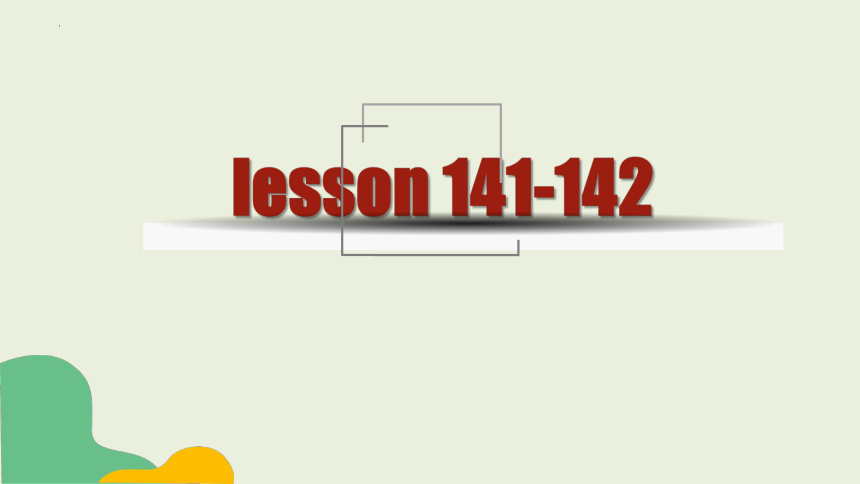 | |
| 格式 | pptx | ||
| 文件大小 | 12.4MB | ||
| 资源类型 | 教案 | ||
| 版本资源 | 新概念英语 | ||
| 科目 | 英语 | ||
| 更新时间 | 2024-01-08 20:20:08 | ||
图片预览


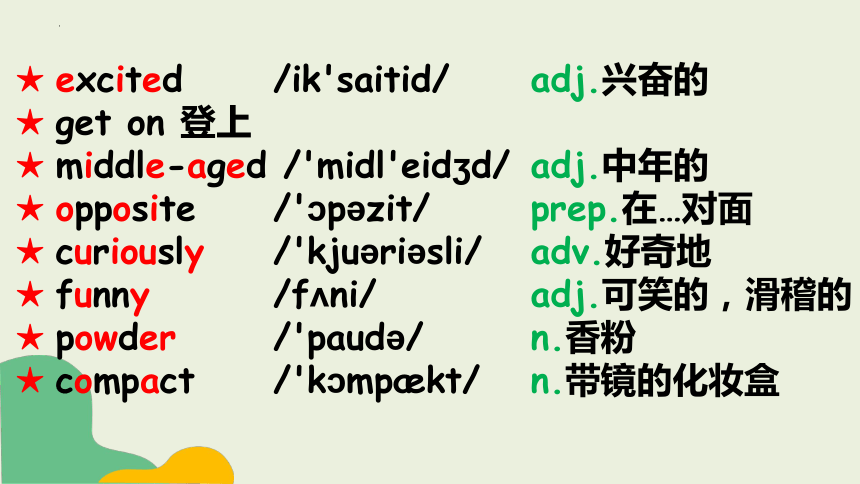
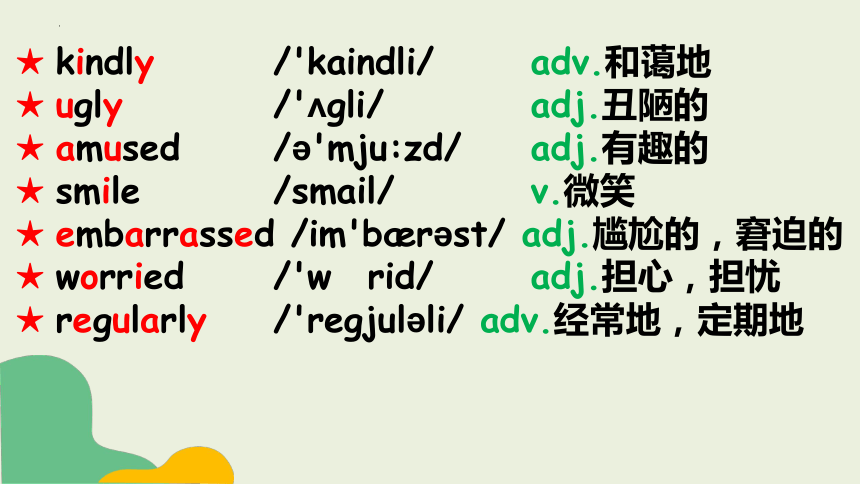
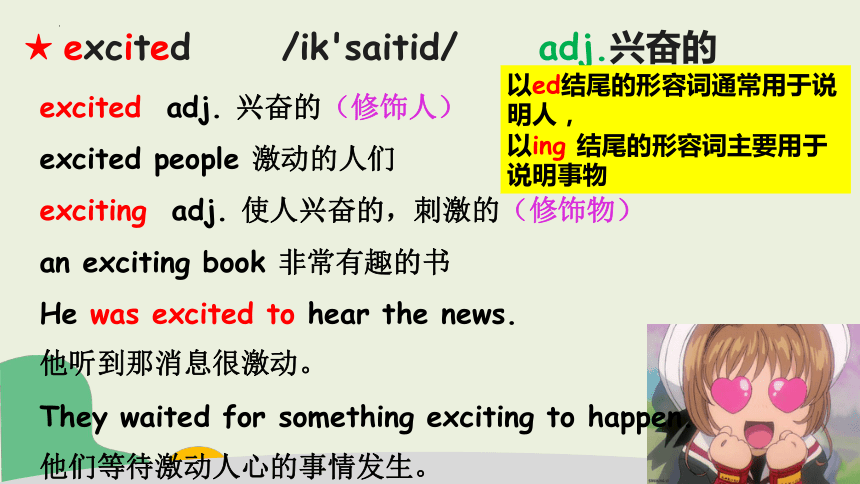
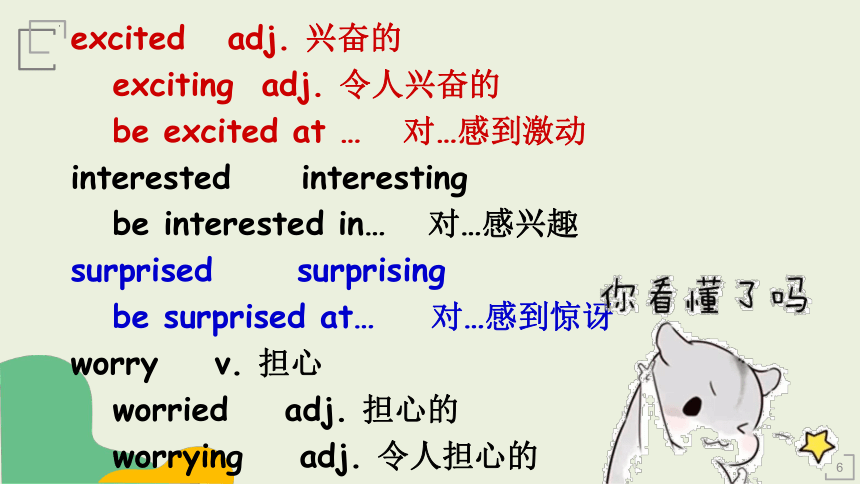
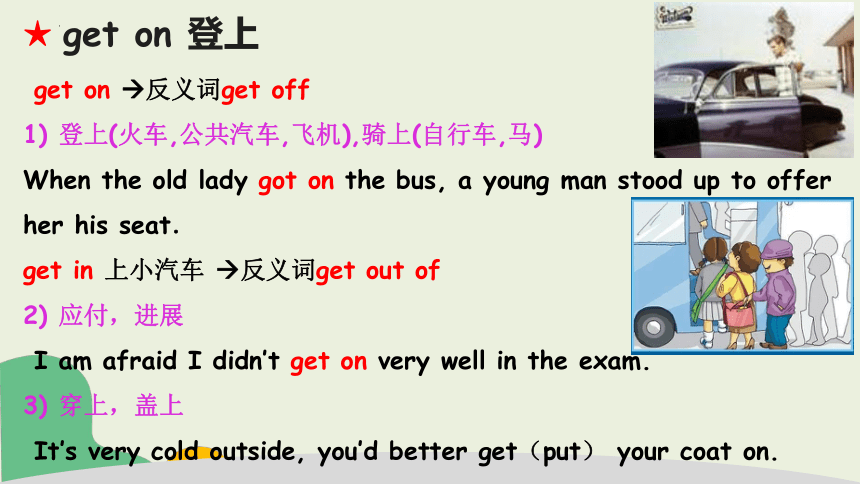
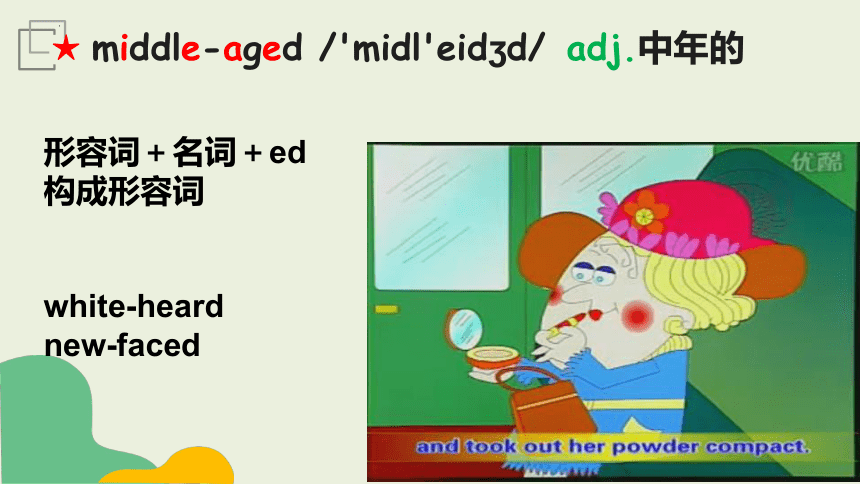
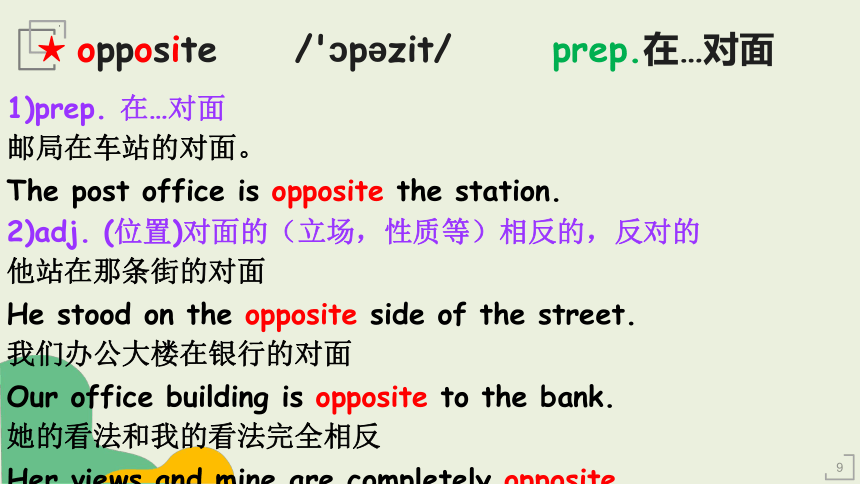
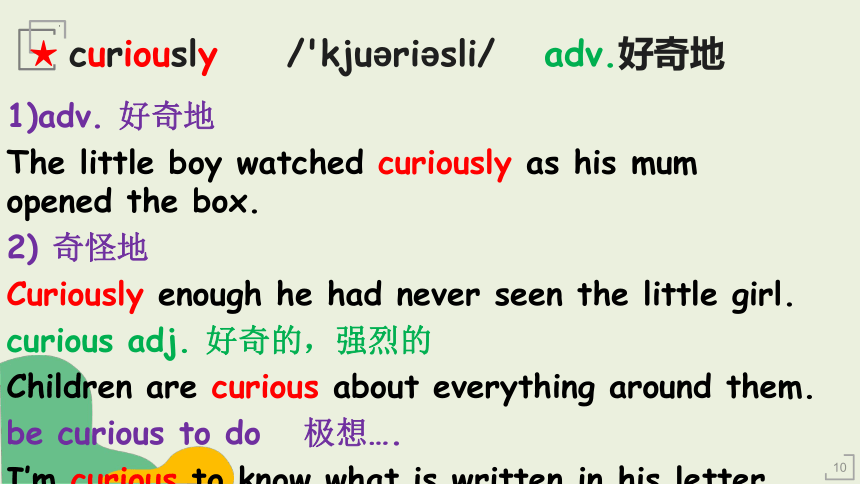
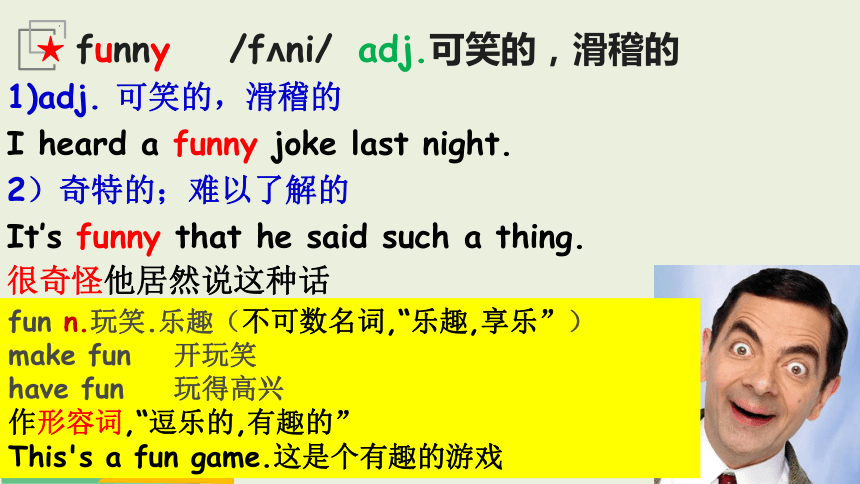
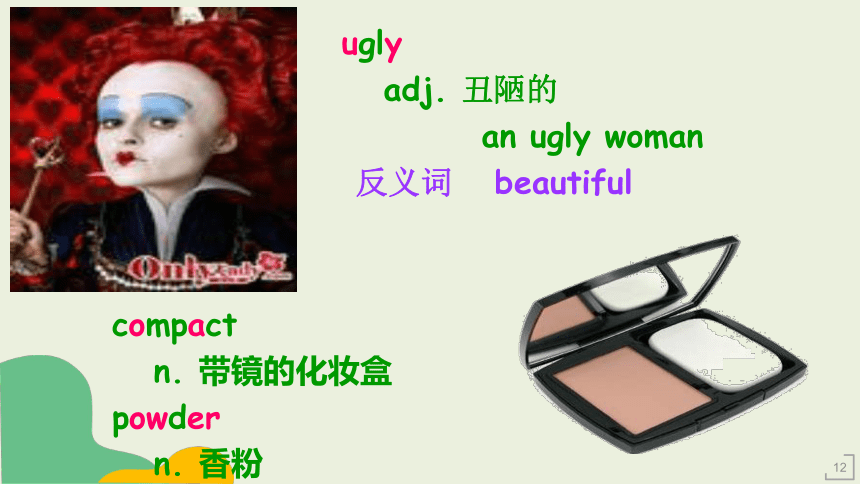
文档简介
(共110张PPT)
lesson 141-142
单词必须积累
words
★ excited /ik'saitid/ adj.兴奋的
★ get on 登上
★ middle-aged /'midl'eid d/ adj.中年的
★ opposite /' p zit/ prep.在…对面
★ curiously /'kju ri sli/ adv.好奇地
★ funny /f ni/ adj.可笑的,滑稽的
★ powder /'paud / n.香粉
★ compact /'k mp kt/ n.带镜的化妆盒
★ kindly /'kaindli/ adv.和蔼地
★ ugly /' gli/ adj.丑陋的
★ amused / 'mju:zd/ adj.有趣的
★ smile /smail/ v.微笑
★ embarrassed /im'b r st/ adj.尴尬的,窘迫的
★ worried /'w rid/ adj.担心,担忧
★ regularly /'regjul li/ adv.经常地,定期地
excited adj. 兴奋的(修饰人)
excited people 激动的人们
exciting adj. 使人兴奋的,刺激的(修饰物)
an exciting book 非常有趣的书
He was excited to hear the news.
他听到那消息很激动。
They waited for something exciting to happen.
他们等待激动人心的事情发生。
★ excited /ik'saitid/ adj.兴奋的
以ed结尾的形容词通常用于说明人,
以ing 结尾的形容词主要用于说明事物
excited adj. 兴奋的
exciting adj. 令人兴奋的
be excited at … 对…感到激动
interested interesting
be interested in… 对…感兴趣
surprised surprising
be surprised at… 对…感到惊讶
worry v. 担心
worried adj. 担心的
worrying adj. 令人担心的
get on 反义词get off
1) 登上(火车,公共汽车,飞机),骑上(自行车,马)
When the old lady got on the bus, a young man stood up to offer her his seat.
get in 上小汽车 反义词get out of
2) 应付,进展
I am afraid I didn’t get on very well in the exam.
3) 穿上,盖上
It’s very cold outside, you’d better get(put) your coat on.
★ get on 登上
★ middle-aged /'midl'eid d/ adj.中年的
形容词+名词+ed
构成形容词
white-heard
new-faced
1)prep. 在…对面
邮局在车站的对面。
The post office is opposite the station.
2)adj. (位置)对面的(立场,性质等)相反的,反对的
他站在那条街的对面
He stood on the opposite side of the street.
我们办公大楼在银行的对面
Our office building is opposite to the bank.
她的看法和我的看法完全相反
Her views and mine are completely opposite.
★ opposite /' p zit/ prep.在…对面
1)adv. 好奇地
The little boy watched curiously as his mum opened the box.
2) 奇怪地
Curiously enough he had never seen the little girl.
curious adj. 好奇的,强烈的
Children are curious about everything around them.
be curious to do 极想….
I’m curious to know what is written in his letter.
★ curiously /'kju ri sli/ adv.好奇地
1)adj. 可笑的,滑稽的
I heard a funny joke last night.
2)奇特的;难以了解的
It’s funny that he said such a thing.
很奇怪他居然说这种话
★ funny /f ni/ adj.可笑的,滑稽的
fun n.玩笑.乐趣(不可数名词,“乐趣,享乐”)
make fun 开玩笑
have fun 玩得高兴
作形容词,“逗乐的,有趣的”
This's a fun game.这是个有趣的游戏
ugly
adj. 丑陋的
an ugly woman
反义词 beautiful
compact
n. 带镜的化妆盒
powder
n. 香粉
The grandma looks very kindly.
kind adj 亲切的,友好的
It’s very kind of you.
kindness n 仁慈,友好的行为
Thank you for your kindness.
【拓展】a kind of 一种
different kinds of 不同种类
all kinds of 各种各样的
★ kindly /'kaindli/ adv.和蔼地
amused adj. 有趣的,表示(人表情等)愉快
I was amused at the music. 我被那音乐逗乐了.
amusing adj. 好笑的,好玩的,有趣的(修饰物)
去年我有过一次好笑的经历。
I had an amusing experience / k'sp r ns;/last year.
amuse v. 使(某人)快乐,逗乐
His jokes amused the crying baby.
★ amused / 'mju:zd/ adj.有趣的
embarrass
embarrassed adj. 尴尬的,窘迫的;修饰人
embarrassing adj. 令人尴尬的;修饰物
你让我尴尬。
You embarrass me.
他感觉很尴尬昨天。
He felt embarrassed yesterday.
这是个令人尴尬的情况。
This is an embarrassing situation.
v. 尴尬,窘迫
★ embarrassed /im'b r st/ adj.尴尬的,窘迫的
v. 微笑 n. 微笑
smile at … 对……微笑
= with a smile 面带微笑,含笑
laugh v. 笑 n. 笑,笑声
laugh at 嘲笑
★ smile /smail/ v.微笑
worried adj 担心的
a worried look 担心的神色
be worried about
She is very worried about her sick mother.
worry v.担心
worry…for… 缠着某人要
He worried his parents for a car.
★ worried /'w rid/ adj.担心,担忧
regularly adv 定期地
He comes here regularly every Friday.
regular adj.有规律的,定期的
a regular customer
老顾客
★ regularly /'regjul li/ adv.经常地,定期地
课文串讲
Last week, my four-year-old daughter, Sally, was invited to a children's party.
I decided to take her by train. Sally was very excited because she had never travelled on a train before.
She sat near the window and asked questions about everything she saw.
Suddenly, a middle-aged lady got on the train and sat opposite Sally.
‘Hello, little girl,’ she said. Sally did not answer, but looked at her curiously. The lady was dressed in a blue coat and a large funny hat.
After the train had left the station, the lady opened her handbag and took out her powder compact.
She then began to make up her face. ‘Why are you doing that ’ Sally asked. ‘To make myself beautiful, ’the lady answered.
She put away her compact and smiled kindly. ‘But you are still ugly , ’ Sally said. Sally was amused, but I was very embarrassed!
课文精讲
Last week, my four-year-old daughter, Sally, was invited to a children’s party.
four-year-old 合成形容词,其中名词必须用单数形式。
一座800米长的桥
a 800-metre-long bridge
was invited to 被邀请去,被动语态
我被邀请参加颁奖仪式。
I am invited to the award ceremony.
I decided to take her by train.
decide to do sth 决定去做某事
我决定开始学习法语。
I’ve decided to learn French.
Sally was very excited because she had never traveled on a train before.
because 连词,引导原因状语从句
我不干,因为我不喜欢。
I won’t do it, because I don’t like it.
on a train=by train
She sat near the window and asked question about everything she saw.
ask questions about 对…提出问题
everything she saw 她所看到的一切
=everything that she saw
Suddenly, a middle-aged lady got on the train and sat opposite Sally.
形容词+名词+ed,构成形容词相当于with介词短语
一个长脸的人
a long-faced man =a man with a long face
一个大眼睛的女孩
a big-eyed girl= a girl with big eyes
get on the train 上火车
“Hello, little girl,’ she said. Sally did not answer, but looked at her curiously.
The lady was dressed in a blue coat and a large, funny hat.
be dressed in (=wear, have on)穿着…
在那个年代,人人都穿蓝色或绿色的衣服。
In those years, everyone was dressed in blue or green.
After the train had left the station, the lady opened her handbag and took out her power compact.
take out 拿出,取出
学生们拿出课本,开始阅读。
The students took out their textbooks and started reading
She then began to make up her face.
make up 化妆,打扮
我们赶到的时候,演员们还在化妆。
The actors were making up when we arrived.
‘Why are you doing that ’ Sally asked.
doing that=making up your face
‘To make myself beautiful,’ the lady answered.
She put away her compact and smiled kindly.
put away 放在一边,收起
他收好书,起身走了。
He put his books away, stood up and left.
'But you are still ugly,' Sally said.
Sally was amused, but I was very embarrassed!
amused 高兴快乐的,开心的,有趣的
embarrassed 分词形容词,尴尬的,窘迫的
phrases
登上
一位中年男人
一个八岁的男孩
坐在窗户附近
问关于数学的问题
坐在电视对面
拿出
开始化妆
放在一边
慈祥的笑着
get on
a middle-aged man
an eight-year-old boy
sit near the window
ask questions about Maths
sit opposite the TV
take out
begin to make up (one’s face)
put away
smile kindly
Key knowledge
被动语态
英语的语态是通过动词形式的变化表现出来的。
英语中有两种语态:主动语态和被动语态。
主动语态表示主语是动作的执行者。
例如:Many people speak Chinese.
谓语:speak的动作是由主语many people来执行的。
被动语态表示主语是动作的承受者,即行为动作的对象。
例如:Chinese is spoken by many people.
主语English是动词speak的承受者。
被动语态的构成
被动语态由“助动词be+及物动词的过去分词”构成。
人称、数和时态的变化是通过be的变化表现出来的。
be + done
只有及物动词才有被动语态。
Key knowledge
被动语态用法
被动语态的用法:
(1)不知道或没有必要说明动作的执行者是谁。
Some new computers were stolen last night.
一些新电脑在昨晚被盗了。(不知道电脑是谁偷的)
This bridge was built in 1981.
这座桥竣工于1981年。 (不知道桥是谁建设的)
被动语态的用法:
(2)强调动作的承受者,而不强调动作的执行者。
The glass was broken by Mike.
玻璃杯是迈克打破的。
This book was written by him.
这本书是他写的。
Your homework must be finished on time.
你们的家庭作业必须及时完成。
Key knowledge
主动语态变被动语态
(1)把主动语态的宾语变为被动语态的主语。
All the people laughed at him.
He was laughed at by all the people.
They make the bikes in the factory.
The bikes are made by them in the factory.
(2)把谓语变成被动结构(be+过去分词)
(根据被动语态句子里的主语的人称和数,
以及原来主动语态句子中动词的时态来决定be的形式)。
All the people laughed at him.
He was laughed at by all the people.
They make the bikes in the factory.
The bikes are made by them in the factory.
(3)把主动语态中的主语放在介词by之后作宾语,
将主格改为宾格
All the people laughed at him.
He was laughed at by all the people.
They make the bikes in the factory.
The bikes are made by them in the factory.
Key knowledge
主动语态变被动语态
总结
主动语态变被动语态解题步骤:
1. 找宾语 ----即动作的承受者
They make shoes in that factory.
Shoes
2. 判断宾语的单复数 ----即be动词的单复数.
are
were
3. 判断动词的时态 ----即be动词的时态.
4. 修改谓语的时态 ----即原句动词改为过去分词
made
5. 修改原句的主语 ----即by+ 主语.
by them.
We cleaned the classroom yesterday.
The classroom
was cleaned
by us...
1.I teach English .
English is taught by me.
2.They made this kind of car in China.
This kind of car was made by them in China
3.He broken the glass.
The glass was broken by him
4.Luxun wrote these books .
These books were written by luxun
5.John answered all the questions.
All the questions were answered by john
6.They will finish the work soon.
The work will be finished by them soon
English is spoken by the most people in the world.
spoken
English
The Great Wall was built by Chinese people.
built
The trees were planted by students.
planted
1.English ____ in Canada.
A. speaks B. are spoken C. is speaking D. is spoken
2.This English song___ by the girls after class.
A. often sings B. often sang
C. is often sang D. is often sung
3.This kind of car ___ in Japan.
A, makes B. made C. is making D. is made
4. New computers ___ all over the world.
A. is used B. are using C. are used D. have used
5. The key ___ on the table when I leave.
A. was left B. will be left C. is left D. has been left
6.Doctors ___ in every part of the world.
A. need B. are needing C. are needed D. will need
改为主动语态
1. The living room is aired by me every morning.
2. The books are tidied by him every day.
3. The car was repaired by Andy.
4. He was caught by Jack.
5. The table was painted by my father.
1. I air the living room every morning.
2. He tidies the books every day.
3. Andy repaired the car.
4. Jack caught him.
5. My father painted the table.
Key knowledge
插入
动词的过去分词(常见)
A B B
play played played
dance danced danced
study studied studied
A A A
cost cost cost
cut cut cut
hurt hurt hurt
put put put
read read read
A A B
beat beat beaten
A B B
buy bought bought
catch caught caught
think thought thought
teach taught taught
build built built
keep kept kept
hear heard heard
find found found
make made made
tell told told
send sent sent
A B A
come came come
run ran run
do did done
go went gone
see saw seen
give gave given
draw drew drawn
eat ate eaten
take took taken
speak spoke spoken
write wrote written
A B C
lesson 143-144
单词必须积累
words
★ surround /s 'raund/ v.包围
★ wood /wud/ n.树林
★ beauty spot 风景点
★ hundred /'h ndrid/ n.百
★ city /'siti/ n.城市
★ through /θru:/ prep.穿过
★ visitor /'vizit / n.参观者,游客,来访者
★ tidy /'taidi/ a.整齐的
★ litter /'lit / n.杂乱的东西
★ litter basket 废物筐
★ place /pleis/ v.放
★ throw /θr u/ v.扔,抛
★ rubbish /'r bi / n.垃圾
★ count /kaunt/ v.数,点
★ cover /'k v / v.覆盖
★ piece /pi:s/ n.碎片
★ tyro /'tai / n.轮胎
★ rusty /'r sti/ a.生锈的
★ among / 'm / prep.在…之间
★ prosecute /'pr sikju:t/ v.依法处置
★ surround /s 'raund/ v.包围
(1) 围绕,环绕
被......包围 be surrounded by
我方水晶塔被敌人包围。
Our crystal is surrounded by enemies.
(2) adj. surrounding 周围的
You should surround yourself with passionate people.
你应该与充满热情的人为伍。
周边地区
the surrounding areas
wood 木头,木材 树木
woods 小树林
forest 森林 可数名词
① n. (复数)树林,森林(通常比forest小)
She got lost in the woods. 她在森林中迷路了。
② n. (不可数)木材,木料
This house is made of wood. 这栋房子是木制的。
Even woods have ears. 隔墙有耳
★ wood /wud/ n.树林
It is a famous beauty spot.
这是一个著名的风景胜地。
beauty 美好;美人;完美
She is known as a great beauty.
Beauty and the Beast 美女与野兽
spot 场地,场所
on the spot 在现场,当场
He got the job on the spot.
★ beauty spot 风景点
a beauty mark
美人痣
① three hundred 三百
② hundreds of 成百上千的
thousands of 成千上万的
thousand, million, billion
millions of 数百万的
billions of 数十亿的
★ hundred /'h ndrid/ n.百
Beijing is the biggest Chinese city.
北京是中国最大的城市。
★ city /'siti/ n.城市
across 横穿,穿过,特指从一边到另一边 表面穿过
swim across the river / walk across the street
over 越过,翻越过去 climb over the mountain
through 穿过 特指从某空间内部穿过
go through the forest
★ through /θru:/ prep.穿过
(1) 穿过(从物体当中贯穿)
Coco每天步行穿过公园。
Coco walks through the park every day.
(2) 从头至尾;彻底
整夜 all through the night
1.表示时间,在……期间 (从头至尾)
He stay abroad all through the year.
2.表示方向,从一端到另一端 (内部)
He went through the forest.
3.表示状态,经历,渡过
I hope I can go through this.
★ through /θru:/ prep.穿过
★ visitor /'vizit / n.参观者,游客,来访者
visit v. 参观
visit + sb./sw. 拜访某人/参观某地
visit n. 参观
on a visit to … 访问,参观
keep it tidy/ clean and tidy
I must tidy myself up.
我得梳理一下.
untidy adj. 不整齐的
★ tidy /'taidi/ adj.整齐的
The street is full of litter.
No litter. 请勿乱扔垃圾
litter basket 垃圾筐
Please do not leave litter.
请勿乱扔垃圾.
He disliked the litter of human dwellings.
他不喜欢住处搞得乱七八糟。
★ litter /'lit / n.杂乱的东西
place v. 放,放置
He placed the books on the shelf.
v. 安置,任命
One can not be in two places at once.
一心不可二用。
place n. 地方
take place 发生,
take the place of 代替
★ place /pleis/ v.放
(threw–thrown)
Please throw. I will catch. 抛过来,我来接。
固定搭配: throw away 抛弃,丢弃,丢掉
throw back 扔回,击退
throw sth. to sb. 投掷,传递
throw sth. at sb. 砸……
★ throw /θr u/ v.扔,抛
rubbish 垃圾; 无意义的东西; 废话; 劣质的东西
a piece of rubbish 一件废弃物
a pile of rubbish 一堆垃圾
He's talking rubbish. 他在胡说八道。
garbage 〈美〉垃圾, 废物;. 垃圾场;
垃圾箱;垃圾桶
★ rubbish /'r bi / n.垃圾
在英国英语中,rubbish最常用来表示丢弃的废物,但是在美国英语中garbage和trash更为常用,
litter 废弃物; 小的垃圾 (纸片、铅笔头)
还可以是动词扔垃圾 乱丢杂物
Please do not litter.
rubbish是不可数名词
count from 1 to 10
count down 倒数 count money 数钱
countable adj. 可数的
uncountable adj. 不可数的
counter n. 柜台;结账处
Count and see how many trees there are in a row.
数数看一行有多少棵树。
★ count /kaunt/ v.数,点
v. 覆盖,遮蔽
The desk was covered with papers.
be covered with … 被……覆盖
cover sth. with sth. 用……覆盖……
v. 掩护
You go first. I'll cover you
Steal a bell with one's ears covered.
掩耳盗铃
n. 封皮,封面 the cover of the book
★ cover /'k v / v.覆盖
★ piece /pi:s/ n.碎片
a piece of 一片...
in/into pieces 成碎片地
cut sth. into pieces 把……切成碎片
a piece of 一块儿,一片儿
a piece of advice 一条建议
a piece of paper 一张纸
a piece of news 一条消息
a piece of wood 一块木头
★ tyre /'tai / n.轮胎
tyre 轮胎 = tire
I found a nail sticking in the tyre.
我发现一根钉子刺进了车胎里。
★ rusty /'r sti/ a.生锈的
adj. 生锈的
rust n. 锈,铁锈/ v. 生锈
★ among / 'm / prep.在…之间
(1)在…中间
王者荣耀在青少年中很受欢迎。
GOK is popular among teenagers.
(2)among、between 区别
among一般用于三者及以上,表示在…中间
他的房子隐藏在树林之中。
His house is hidden among the trees.
between一般指两者之间
两个男孩间发生了格斗。
There was a fight between the two boys.
★ prosecute /'pr sikju:t/ v.依法处置
① v. 起诉,检举;依法处置
Trespassers[ tr sp s z] will be prosecuted.
闲人莫入,违者法办。
② v.(书面语)彻底进行;执行
We are going to prosecute the investigation further. 我们将进一步彻底进行调查。
★ surround /s 'raund/ v.包围
★ wood /wud/ n.树林
★ beauty spot 风景点
★ hundred /'h ndrid/ n.百
★ city /'siti/ n.城市
★ through /θru:/ prep.穿过
★ visitor /'vizit / n.参观者,游客,来访者
★ tidy /'taidi/ a.整齐的
★ litter /'lit / n.杂乱的东西
★ litter basket 废物筐
★ place /pleis/ v.放
★ throw /θr u/ v.扔,抛
★ rubbish /'r bi / n.垃圾
★ count /kaunt/ v.数,点
★ cover /'k v / v.覆盖
★ piece /pi:s/ n.碎片
★ tyro /'tai / n.轮胎
★ rusty /'r sti/ a.生锈的
★ among / 'm / prep.在…之间
★ prosecute /'pr sikju:t/ v.依法处置
课文串讲
I live in a very old town which is surrounded by beautiful woods.
It is a famous beauty spot.
On Sundays, hundreds of people come from the city to see our town and to walk through the woods.
Visitors have been asked to keep the woods clean and tidy. Litter baskets have been placed under the trees. But people still throw their rubbish everywhere.
Last Wednesday, I went for a walk in the woods. What I saw made me very sad. I counted seven old cars and three old refrigerators.
The litter baskets were empty and the ground was covered with pieces of paper, cigarette ends, old tyres, empty bottles and rusty tins.
Among the rubbish, I found a sign which said, ‘Anyone who leaves litter in these woods will be prosecuted!’
课文精讲
I live in a very old town which is surrounded by beautiful woods.
be surrounded by 四周环绕着
我住在一个四周围绕着高楼的地方。
I live in a place which is surrounded by tall buildings.
我住在四周围绕着山的小村中。
I live in a village which is surrounded by hills.
It is a famous beauty spot.
Beauty spot 风景点
Tourist attraction 游览胜地
On Sundays, hundreds of people come from the city to see our town and to walk through the woods.
hundreds of 成百上千的
What I saw made me very sad.
句中的主语 What I saw 是 what 引导的名词性从句(主语从句)。
那个小男孩所做的一切使他母亲十分惊讶。
What the little boy did surprised his mother.
你所做的使我愉快。
What you do makes me happy.
The little baskets were empty and the ground was covered with pieces of paper, cigarette ends, old tyres, empty bottles and rusty tins.
be covered with ... 被 ...... 覆盖
桌子上布满了灰尘。
The desks are covered with dust.
地上覆盖着雪。
The ground was covered with snow.
Among the rubbish, I found a sign which said, 'Anyone who leaves litter in these woods will be prosecuted!'
该晚会来者不拒。
Anyone who comes to the party is welcome.
任何违反交通规则的人都会被罚款。
Anyone who breaks the traffic regulations will be fined.
Key knowledge
被动语态 二
Football is played all over the world.
This umbrella has been given to my parents.
A road is being built around the mountain.
This house was built in 1958.
Meeting was being held when I was there.
He will be taken to hospital tomorrow.
The house had been sold before I asked the price.
被动语态的时态:
只改变be的形式,
过去分词部分都不变,
疑问句和否定句的变化也是如此.
1) 一般现在时的被动语态:
构成:be (is/ am/ are) +过去分词
3) 一般将来时的被动语态
构成:will/shall/ be going to be +过去分词
2) 一般过去式的被动语态
构成:was/were +过去分词
She is praised by her English teacher.
4)现在进行时的被动语态
构成:is/ am/ are +being+过去分词
6)现在完成时的被动语态
构成:have/has +been +过去分词
5)过去进行时的被动语态
构成:was/were +being +过去分词
7)情态动词的被动语态
构成:can / must /may/+be +过去分词
如果是含有情态动词的被动语态,
结构为:情态动词+be +done,
其时态及句型的变化仅由情态动词完成,
be+ done部分不变.
情态动词:
情态动词+动词原形
情态动词+be+动词过去分词
You must finish the work before five o’clock.
The work must be finished before five o’clock.
一现
be
am, is, are
现进
be
am, is, are
一过
be
was
一将
be
will
现完
be
has/have
情态动词
be
can
be
ing
/ were
be
be
en
be
be体现时态
done恒定不变
done
done
done
done
done
done
各种时态被动
can
can
must
may
must
might
情态动词被动
may
might
be done
be done
be done
be done
1.一般现在时 am /is /are +过去分词
这辆车被修理过了。
那位老人由我照顾。
每天都给那些花儿浇水。
2.一般过去时 was /were +过去分词
Sally 被邀请去参加一个聚会。
Sally was invited to a party.
她写了很多首歌曲。
Many songs were written by her.
Lily被邀请唱了一首歌。
Lily was asked to sing a song.
This car is repaired.
That old man is looked after (by me).
The flowers are watered every day.
3.现在完成时 have/has +been +V.pp
这辆车已经修好了。
The car has already been repaired.
活儿都干完了。
The work has been finished by me .
那个篮子已经被清空了。
That basket has already been emptied .
4.一般将来时的被动 :will/shall +be +V.pp
小偷马上会被抓的。
The thieves will be caught soon.
地板很快就会被打扫的。
The floor will be cleaned .
这些机器将要被修理。
The machine will be repaired .
lesson 141-142
单词必须积累
words
★ excited /ik'saitid/ adj.兴奋的
★ get on 登上
★ middle-aged /'midl'eid d/ adj.中年的
★ opposite /' p zit/ prep.在…对面
★ curiously /'kju ri sli/ adv.好奇地
★ funny /f ni/ adj.可笑的,滑稽的
★ powder /'paud / n.香粉
★ compact /'k mp kt/ n.带镜的化妆盒
★ kindly /'kaindli/ adv.和蔼地
★ ugly /' gli/ adj.丑陋的
★ amused / 'mju:zd/ adj.有趣的
★ smile /smail/ v.微笑
★ embarrassed /im'b r st/ adj.尴尬的,窘迫的
★ worried /'w rid/ adj.担心,担忧
★ regularly /'regjul li/ adv.经常地,定期地
excited adj. 兴奋的(修饰人)
excited people 激动的人们
exciting adj. 使人兴奋的,刺激的(修饰物)
an exciting book 非常有趣的书
He was excited to hear the news.
他听到那消息很激动。
They waited for something exciting to happen.
他们等待激动人心的事情发生。
★ excited /ik'saitid/ adj.兴奋的
以ed结尾的形容词通常用于说明人,
以ing 结尾的形容词主要用于说明事物
excited adj. 兴奋的
exciting adj. 令人兴奋的
be excited at … 对…感到激动
interested interesting
be interested in… 对…感兴趣
surprised surprising
be surprised at… 对…感到惊讶
worry v. 担心
worried adj. 担心的
worrying adj. 令人担心的
get on 反义词get off
1) 登上(火车,公共汽车,飞机),骑上(自行车,马)
When the old lady got on the bus, a young man stood up to offer her his seat.
get in 上小汽车 反义词get out of
2) 应付,进展
I am afraid I didn’t get on very well in the exam.
3) 穿上,盖上
It’s very cold outside, you’d better get(put) your coat on.
★ get on 登上
★ middle-aged /'midl'eid d/ adj.中年的
形容词+名词+ed
构成形容词
white-heard
new-faced
1)prep. 在…对面
邮局在车站的对面。
The post office is opposite the station.
2)adj. (位置)对面的(立场,性质等)相反的,反对的
他站在那条街的对面
He stood on the opposite side of the street.
我们办公大楼在银行的对面
Our office building is opposite to the bank.
她的看法和我的看法完全相反
Her views and mine are completely opposite.
★ opposite /' p zit/ prep.在…对面
1)adv. 好奇地
The little boy watched curiously as his mum opened the box.
2) 奇怪地
Curiously enough he had never seen the little girl.
curious adj. 好奇的,强烈的
Children are curious about everything around them.
be curious to do 极想….
I’m curious to know what is written in his letter.
★ curiously /'kju ri sli/ adv.好奇地
1)adj. 可笑的,滑稽的
I heard a funny joke last night.
2)奇特的;难以了解的
It’s funny that he said such a thing.
很奇怪他居然说这种话
★ funny /f ni/ adj.可笑的,滑稽的
fun n.玩笑.乐趣(不可数名词,“乐趣,享乐”)
make fun 开玩笑
have fun 玩得高兴
作形容词,“逗乐的,有趣的”
This's a fun game.这是个有趣的游戏
ugly
adj. 丑陋的
an ugly woman
反义词 beautiful
compact
n. 带镜的化妆盒
powder
n. 香粉
The grandma looks very kindly.
kind adj 亲切的,友好的
It’s very kind of you.
kindness n 仁慈,友好的行为
Thank you for your kindness.
【拓展】a kind of 一种
different kinds of 不同种类
all kinds of 各种各样的
★ kindly /'kaindli/ adv.和蔼地
amused adj. 有趣的,表示(人表情等)愉快
I was amused at the music. 我被那音乐逗乐了.
amusing adj. 好笑的,好玩的,有趣的(修饰物)
去年我有过一次好笑的经历。
I had an amusing experience / k'sp r ns;/last year.
amuse v. 使(某人)快乐,逗乐
His jokes amused the crying baby.
★ amused / 'mju:zd/ adj.有趣的
embarrass
embarrassed adj. 尴尬的,窘迫的;修饰人
embarrassing adj. 令人尴尬的;修饰物
你让我尴尬。
You embarrass me.
他感觉很尴尬昨天。
He felt embarrassed yesterday.
这是个令人尴尬的情况。
This is an embarrassing situation.
v. 尴尬,窘迫
★ embarrassed /im'b r st/ adj.尴尬的,窘迫的
v. 微笑 n. 微笑
smile at … 对……微笑
= with a smile 面带微笑,含笑
laugh v. 笑 n. 笑,笑声
laugh at 嘲笑
★ smile /smail/ v.微笑
worried adj 担心的
a worried look 担心的神色
be worried about
She is very worried about her sick mother.
worry v.担心
worry…for… 缠着某人要
He worried his parents for a car.
★ worried /'w rid/ adj.担心,担忧
regularly adv 定期地
He comes here regularly every Friday.
regular adj.有规律的,定期的
a regular customer
老顾客
★ regularly /'regjul li/ adv.经常地,定期地
课文串讲
Last week, my four-year-old daughter, Sally, was invited to a children's party.
I decided to take her by train. Sally was very excited because she had never travelled on a train before.
She sat near the window and asked questions about everything she saw.
Suddenly, a middle-aged lady got on the train and sat opposite Sally.
‘Hello, little girl,’ she said. Sally did not answer, but looked at her curiously. The lady was dressed in a blue coat and a large funny hat.
After the train had left the station, the lady opened her handbag and took out her powder compact.
She then began to make up her face. ‘Why are you doing that ’ Sally asked. ‘To make myself beautiful, ’the lady answered.
She put away her compact and smiled kindly. ‘But you are still ugly , ’ Sally said. Sally was amused, but I was very embarrassed!
课文精讲
Last week, my four-year-old daughter, Sally, was invited to a children’s party.
four-year-old 合成形容词,其中名词必须用单数形式。
一座800米长的桥
a 800-metre-long bridge
was invited to 被邀请去,被动语态
我被邀请参加颁奖仪式。
I am invited to the award ceremony.
I decided to take her by train.
decide to do sth 决定去做某事
我决定开始学习法语。
I’ve decided to learn French.
Sally was very excited because she had never traveled on a train before.
because 连词,引导原因状语从句
我不干,因为我不喜欢。
I won’t do it, because I don’t like it.
on a train=by train
She sat near the window and asked question about everything she saw.
ask questions about 对…提出问题
everything she saw 她所看到的一切
=everything that she saw
Suddenly, a middle-aged lady got on the train and sat opposite Sally.
形容词+名词+ed,构成形容词相当于with介词短语
一个长脸的人
a long-faced man =a man with a long face
一个大眼睛的女孩
a big-eyed girl= a girl with big eyes
get on the train 上火车
“Hello, little girl,’ she said. Sally did not answer, but looked at her curiously.
The lady was dressed in a blue coat and a large, funny hat.
be dressed in (=wear, have on)穿着…
在那个年代,人人都穿蓝色或绿色的衣服。
In those years, everyone was dressed in blue or green.
After the train had left the station, the lady opened her handbag and took out her power compact.
take out 拿出,取出
学生们拿出课本,开始阅读。
The students took out their textbooks and started reading
She then began to make up her face.
make up 化妆,打扮
我们赶到的时候,演员们还在化妆。
The actors were making up when we arrived.
‘Why are you doing that ’ Sally asked.
doing that=making up your face
‘To make myself beautiful,’ the lady answered.
She put away her compact and smiled kindly.
put away 放在一边,收起
他收好书,起身走了。
He put his books away, stood up and left.
'But you are still ugly,' Sally said.
Sally was amused, but I was very embarrassed!
amused 高兴快乐的,开心的,有趣的
embarrassed 分词形容词,尴尬的,窘迫的
phrases
登上
一位中年男人
一个八岁的男孩
坐在窗户附近
问关于数学的问题
坐在电视对面
拿出
开始化妆
放在一边
慈祥的笑着
get on
a middle-aged man
an eight-year-old boy
sit near the window
ask questions about Maths
sit opposite the TV
take out
begin to make up (one’s face)
put away
smile kindly
Key knowledge
被动语态
英语的语态是通过动词形式的变化表现出来的。
英语中有两种语态:主动语态和被动语态。
主动语态表示主语是动作的执行者。
例如:Many people speak Chinese.
谓语:speak的动作是由主语many people来执行的。
被动语态表示主语是动作的承受者,即行为动作的对象。
例如:Chinese is spoken by many people.
主语English是动词speak的承受者。
被动语态的构成
被动语态由“助动词be+及物动词的过去分词”构成。
人称、数和时态的变化是通过be的变化表现出来的。
be + done
只有及物动词才有被动语态。
Key knowledge
被动语态用法
被动语态的用法:
(1)不知道或没有必要说明动作的执行者是谁。
Some new computers were stolen last night.
一些新电脑在昨晚被盗了。(不知道电脑是谁偷的)
This bridge was built in 1981.
这座桥竣工于1981年。 (不知道桥是谁建设的)
被动语态的用法:
(2)强调动作的承受者,而不强调动作的执行者。
The glass was broken by Mike.
玻璃杯是迈克打破的。
This book was written by him.
这本书是他写的。
Your homework must be finished on time.
你们的家庭作业必须及时完成。
Key knowledge
主动语态变被动语态
(1)把主动语态的宾语变为被动语态的主语。
All the people laughed at him.
He was laughed at by all the people.
They make the bikes in the factory.
The bikes are made by them in the factory.
(2)把谓语变成被动结构(be+过去分词)
(根据被动语态句子里的主语的人称和数,
以及原来主动语态句子中动词的时态来决定be的形式)。
All the people laughed at him.
He was laughed at by all the people.
They make the bikes in the factory.
The bikes are made by them in the factory.
(3)把主动语态中的主语放在介词by之后作宾语,
将主格改为宾格
All the people laughed at him.
He was laughed at by all the people.
They make the bikes in the factory.
The bikes are made by them in the factory.
Key knowledge
主动语态变被动语态
总结
主动语态变被动语态解题步骤:
1. 找宾语 ----即动作的承受者
They make shoes in that factory.
Shoes
2. 判断宾语的单复数 ----即be动词的单复数.
are
were
3. 判断动词的时态 ----即be动词的时态.
4. 修改谓语的时态 ----即原句动词改为过去分词
made
5. 修改原句的主语 ----即by+ 主语.
by them.
We cleaned the classroom yesterday.
The classroom
was cleaned
by us...
1.I teach English .
English is taught by me.
2.They made this kind of car in China.
This kind of car was made by them in China
3.He broken the glass.
The glass was broken by him
4.Luxun wrote these books .
These books were written by luxun
5.John answered all the questions.
All the questions were answered by john
6.They will finish the work soon.
The work will be finished by them soon
English is spoken by the most people in the world.
spoken
English
The Great Wall was built by Chinese people.
built
The trees were planted by students.
planted
1.English ____ in Canada.
A. speaks B. are spoken C. is speaking D. is spoken
2.This English song___ by the girls after class.
A. often sings B. often sang
C. is often sang D. is often sung
3.This kind of car ___ in Japan.
A, makes B. made C. is making D. is made
4. New computers ___ all over the world.
A. is used B. are using C. are used D. have used
5. The key ___ on the table when I leave.
A. was left B. will be left C. is left D. has been left
6.Doctors ___ in every part of the world.
A. need B. are needing C. are needed D. will need
改为主动语态
1. The living room is aired by me every morning.
2. The books are tidied by him every day.
3. The car was repaired by Andy.
4. He was caught by Jack.
5. The table was painted by my father.
1. I air the living room every morning.
2. He tidies the books every day.
3. Andy repaired the car.
4. Jack caught him.
5. My father painted the table.
Key knowledge
插入
动词的过去分词(常见)
A B B
play played played
dance danced danced
study studied studied
A A A
cost cost cost
cut cut cut
hurt hurt hurt
put put put
read read read
A A B
beat beat beaten
A B B
buy bought bought
catch caught caught
think thought thought
teach taught taught
build built built
keep kept kept
hear heard heard
find found found
make made made
tell told told
send sent sent
A B A
come came come
run ran run
do did done
go went gone
see saw seen
give gave given
draw drew drawn
eat ate eaten
take took taken
speak spoke spoken
write wrote written
A B C
lesson 143-144
单词必须积累
words
★ surround /s 'raund/ v.包围
★ wood /wud/ n.树林
★ beauty spot 风景点
★ hundred /'h ndrid/ n.百
★ city /'siti/ n.城市
★ through /θru:/ prep.穿过
★ visitor /'vizit / n.参观者,游客,来访者
★ tidy /'taidi/ a.整齐的
★ litter /'lit / n.杂乱的东西
★ litter basket 废物筐
★ place /pleis/ v.放
★ throw /θr u/ v.扔,抛
★ rubbish /'r bi / n.垃圾
★ count /kaunt/ v.数,点
★ cover /'k v / v.覆盖
★ piece /pi:s/ n.碎片
★ tyro /'tai / n.轮胎
★ rusty /'r sti/ a.生锈的
★ among / 'm / prep.在…之间
★ prosecute /'pr sikju:t/ v.依法处置
★ surround /s 'raund/ v.包围
(1) 围绕,环绕
被......包围 be surrounded by
我方水晶塔被敌人包围。
Our crystal is surrounded by enemies.
(2) adj. surrounding 周围的
You should surround yourself with passionate people.
你应该与充满热情的人为伍。
周边地区
the surrounding areas
wood 木头,木材 树木
woods 小树林
forest 森林 可数名词
① n. (复数)树林,森林(通常比forest小)
She got lost in the woods. 她在森林中迷路了。
② n. (不可数)木材,木料
This house is made of wood. 这栋房子是木制的。
Even woods have ears. 隔墙有耳
★ wood /wud/ n.树林
It is a famous beauty spot.
这是一个著名的风景胜地。
beauty 美好;美人;完美
She is known as a great beauty.
Beauty and the Beast 美女与野兽
spot 场地,场所
on the spot 在现场,当场
He got the job on the spot.
★ beauty spot 风景点
a beauty mark
美人痣
① three hundred 三百
② hundreds of 成百上千的
thousands of 成千上万的
thousand, million, billion
millions of 数百万的
billions of 数十亿的
★ hundred /'h ndrid/ n.百
Beijing is the biggest Chinese city.
北京是中国最大的城市。
★ city /'siti/ n.城市
across 横穿,穿过,特指从一边到另一边 表面穿过
swim across the river / walk across the street
over 越过,翻越过去 climb over the mountain
through 穿过 特指从某空间内部穿过
go through the forest
★ through /θru:/ prep.穿过
(1) 穿过(从物体当中贯穿)
Coco每天步行穿过公园。
Coco walks through the park every day.
(2) 从头至尾;彻底
整夜 all through the night
1.表示时间,在……期间 (从头至尾)
He stay abroad all through the year.
2.表示方向,从一端到另一端 (内部)
He went through the forest.
3.表示状态,经历,渡过
I hope I can go through this.
★ through /θru:/ prep.穿过
★ visitor /'vizit / n.参观者,游客,来访者
visit v. 参观
visit + sb./sw. 拜访某人/参观某地
visit n. 参观
on a visit to … 访问,参观
keep it tidy/ clean and tidy
I must tidy myself up.
我得梳理一下.
untidy adj. 不整齐的
★ tidy /'taidi/ adj.整齐的
The street is full of litter.
No litter. 请勿乱扔垃圾
litter basket 垃圾筐
Please do not leave litter.
请勿乱扔垃圾.
He disliked the litter of human dwellings.
他不喜欢住处搞得乱七八糟。
★ litter /'lit / n.杂乱的东西
place v. 放,放置
He placed the books on the shelf.
v. 安置,任命
One can not be in two places at once.
一心不可二用。
place n. 地方
take place 发生,
take the place of 代替
★ place /pleis/ v.放
(threw–thrown)
Please throw. I will catch. 抛过来,我来接。
固定搭配: throw away 抛弃,丢弃,丢掉
throw back 扔回,击退
throw sth. to sb. 投掷,传递
throw sth. at sb. 砸……
★ throw /θr u/ v.扔,抛
rubbish 垃圾; 无意义的东西; 废话; 劣质的东西
a piece of rubbish 一件废弃物
a pile of rubbish 一堆垃圾
He's talking rubbish. 他在胡说八道。
garbage 〈美〉垃圾, 废物;. 垃圾场;
垃圾箱;垃圾桶
★ rubbish /'r bi / n.垃圾
在英国英语中,rubbish最常用来表示丢弃的废物,但是在美国英语中garbage和trash更为常用,
litter 废弃物; 小的垃圾 (纸片、铅笔头)
还可以是动词扔垃圾 乱丢杂物
Please do not litter.
rubbish是不可数名词
count from 1 to 10
count down 倒数 count money 数钱
countable adj. 可数的
uncountable adj. 不可数的
counter n. 柜台;结账处
Count and see how many trees there are in a row.
数数看一行有多少棵树。
★ count /kaunt/ v.数,点
v. 覆盖,遮蔽
The desk was covered with papers.
be covered with … 被……覆盖
cover sth. with sth. 用……覆盖……
v. 掩护
You go first. I'll cover you
Steal a bell with one's ears covered.
掩耳盗铃
n. 封皮,封面 the cover of the book
★ cover /'k v / v.覆盖
★ piece /pi:s/ n.碎片
a piece of 一片...
in/into pieces 成碎片地
cut sth. into pieces 把……切成碎片
a piece of 一块儿,一片儿
a piece of advice 一条建议
a piece of paper 一张纸
a piece of news 一条消息
a piece of wood 一块木头
★ tyre /'tai / n.轮胎
tyre 轮胎 = tire
I found a nail sticking in the tyre.
我发现一根钉子刺进了车胎里。
★ rusty /'r sti/ a.生锈的
adj. 生锈的
rust n. 锈,铁锈/ v. 生锈
★ among / 'm / prep.在…之间
(1)在…中间
王者荣耀在青少年中很受欢迎。
GOK is popular among teenagers.
(2)among、between 区别
among一般用于三者及以上,表示在…中间
他的房子隐藏在树林之中。
His house is hidden among the trees.
between一般指两者之间
两个男孩间发生了格斗。
There was a fight between the two boys.
★ prosecute /'pr sikju:t/ v.依法处置
① v. 起诉,检举;依法处置
Trespassers[ tr sp s z] will be prosecuted.
闲人莫入,违者法办。
② v.(书面语)彻底进行;执行
We are going to prosecute the investigation further. 我们将进一步彻底进行调查。
★ surround /s 'raund/ v.包围
★ wood /wud/ n.树林
★ beauty spot 风景点
★ hundred /'h ndrid/ n.百
★ city /'siti/ n.城市
★ through /θru:/ prep.穿过
★ visitor /'vizit / n.参观者,游客,来访者
★ tidy /'taidi/ a.整齐的
★ litter /'lit / n.杂乱的东西
★ litter basket 废物筐
★ place /pleis/ v.放
★ throw /θr u/ v.扔,抛
★ rubbish /'r bi / n.垃圾
★ count /kaunt/ v.数,点
★ cover /'k v / v.覆盖
★ piece /pi:s/ n.碎片
★ tyro /'tai / n.轮胎
★ rusty /'r sti/ a.生锈的
★ among / 'm / prep.在…之间
★ prosecute /'pr sikju:t/ v.依法处置
课文串讲
I live in a very old town which is surrounded by beautiful woods.
It is a famous beauty spot.
On Sundays, hundreds of people come from the city to see our town and to walk through the woods.
Visitors have been asked to keep the woods clean and tidy. Litter baskets have been placed under the trees. But people still throw their rubbish everywhere.
Last Wednesday, I went for a walk in the woods. What I saw made me very sad. I counted seven old cars and three old refrigerators.
The litter baskets were empty and the ground was covered with pieces of paper, cigarette ends, old tyres, empty bottles and rusty tins.
Among the rubbish, I found a sign which said, ‘Anyone who leaves litter in these woods will be prosecuted!’
课文精讲
I live in a very old town which is surrounded by beautiful woods.
be surrounded by 四周环绕着
我住在一个四周围绕着高楼的地方。
I live in a place which is surrounded by tall buildings.
我住在四周围绕着山的小村中。
I live in a village which is surrounded by hills.
It is a famous beauty spot.
Beauty spot 风景点
Tourist attraction 游览胜地
On Sundays, hundreds of people come from the city to see our town and to walk through the woods.
hundreds of 成百上千的
What I saw made me very sad.
句中的主语 What I saw 是 what 引导的名词性从句(主语从句)。
那个小男孩所做的一切使他母亲十分惊讶。
What the little boy did surprised his mother.
你所做的使我愉快。
What you do makes me happy.
The little baskets were empty and the ground was covered with pieces of paper, cigarette ends, old tyres, empty bottles and rusty tins.
be covered with ... 被 ...... 覆盖
桌子上布满了灰尘。
The desks are covered with dust.
地上覆盖着雪。
The ground was covered with snow.
Among the rubbish, I found a sign which said, 'Anyone who leaves litter in these woods will be prosecuted!'
该晚会来者不拒。
Anyone who comes to the party is welcome.
任何违反交通规则的人都会被罚款。
Anyone who breaks the traffic regulations will be fined.
Key knowledge
被动语态 二
Football is played all over the world.
This umbrella has been given to my parents.
A road is being built around the mountain.
This house was built in 1958.
Meeting was being held when I was there.
He will be taken to hospital tomorrow.
The house had been sold before I asked the price.
被动语态的时态:
只改变be的形式,
过去分词部分都不变,
疑问句和否定句的变化也是如此.
1) 一般现在时的被动语态:
构成:be (is/ am/ are) +过去分词
3) 一般将来时的被动语态
构成:will/shall/ be going to be +过去分词
2) 一般过去式的被动语态
构成:was/were +过去分词
She is praised by her English teacher.
4)现在进行时的被动语态
构成:is/ am/ are +being+过去分词
6)现在完成时的被动语态
构成:have/has +been +过去分词
5)过去进行时的被动语态
构成:was/were +being +过去分词
7)情态动词的被动语态
构成:can / must /may/+be +过去分词
如果是含有情态动词的被动语态,
结构为:情态动词+be +done,
其时态及句型的变化仅由情态动词完成,
be+ done部分不变.
情态动词:
情态动词+动词原形
情态动词+be+动词过去分词
You must finish the work before five o’clock.
The work must be finished before five o’clock.
一现
be
am, is, are
现进
be
am, is, are
一过
be
was
一将
be
will
现完
be
has/have
情态动词
be
can
be
ing
/ were
be
be
en
be
be体现时态
done恒定不变
done
done
done
done
done
done
各种时态被动
can
can
must
may
must
might
情态动词被动
may
might
be done
be done
be done
be done
1.一般现在时 am /is /are +过去分词
这辆车被修理过了。
那位老人由我照顾。
每天都给那些花儿浇水。
2.一般过去时 was /were +过去分词
Sally 被邀请去参加一个聚会。
Sally was invited to a party.
她写了很多首歌曲。
Many songs were written by her.
Lily被邀请唱了一首歌。
Lily was asked to sing a song.
This car is repaired.
That old man is looked after (by me).
The flowers are watered every day.
3.现在完成时 have/has +been +V.pp
这辆车已经修好了。
The car has already been repaired.
活儿都干完了。
The work has been finished by me .
那个篮子已经被清空了。
That basket has already been emptied .
4.一般将来时的被动 :will/shall +be +V.pp
小偷马上会被抓的。
The thieves will be caught soon.
地板很快就会被打扫的。
The floor will be cleaned .
这些机器将要被修理。
The machine will be repaired .
同课章节目录
